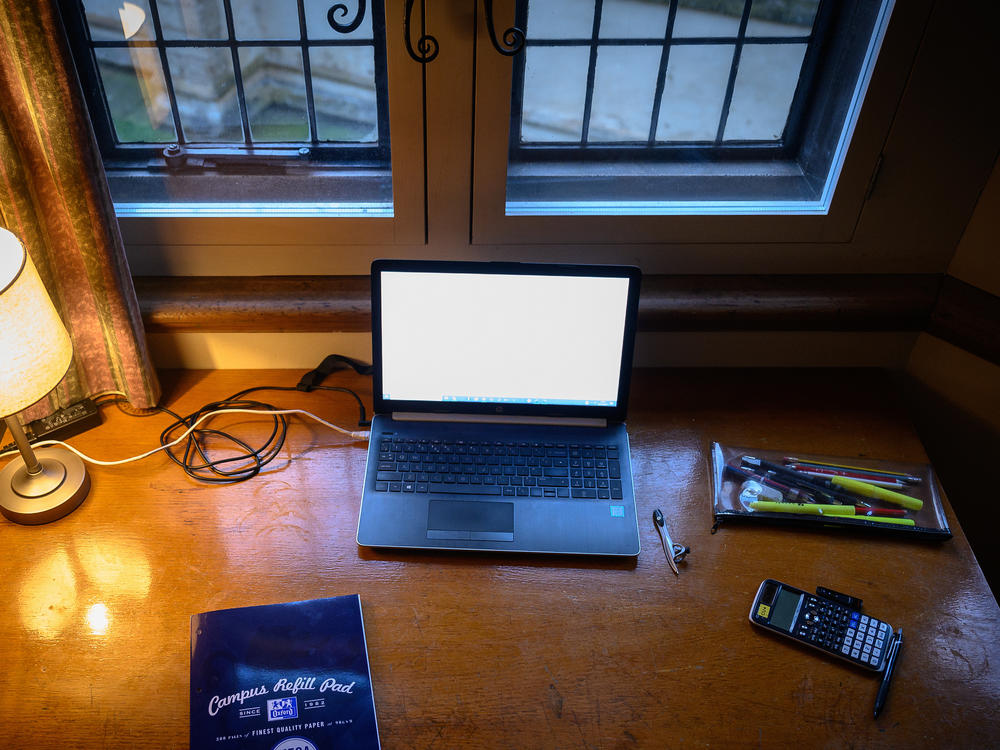Section Branding
Header Content
Scanning students' rooms during remote tests is unconstitutional, judge rules
Primary Content
Updated August 26, 2022 at 3:11 PM ET
The remote-proctored exam that colleges began using widely during the pandemic saw a first big legal test of its own — one that concluded in a ruling applauded by digital privacy advocates.
A federal judge this week sided with a student at Cleveland State University in Ohio, who alleged that a room scan taken before his online test as a proctoring measure was unconstitutional.
Aaron Ogletree, a chemistry student, sat for a test during his spring semester last year. Before starting the exam, he was asked to show the virtual proctor his bedroom. He complied, and the recording data was stored by one of the school's third-party proctoring tools, Honorlock, according to the ruling documents.
Ogletree then sued his university, alleging that the room scan violated his Fourth Amendment rights protecting U.S. citizens against "unreasonable searches and seizures." In its defense, Cleveland State argued that room scans are not "searches," because they are limited in scope, conducted to ensure academic fairness and exam integrity, and not coerced.
U.S. district court Judge J. Philip Calabrese on Monday decided in Ogletree's favor: Room scans are unconstitutional.
"Mr. Ogletree's privacy interest in his home outweighs Cleveland State's interests in scanning his room. Accordingly, the Court determines that Cleveland State's practice of conducting room scans is unreasonable under the Fourth Amendment," Judge Calabrese concluded.
Since 2020, COVID-19 restrictions have forced students to take remote exams, so universities have come to rely on browser plug-ins and other software from third-party proctor companies to prevent cheating on tests.
Civil rights attorney Matthew Besser, who represented Ogletree, described the decision as a landmark case in a post on his firm's blog: "The case appears to be the first in the nation to hold that the Fourth Amendment protects students from unreasonable video searches of their homes before taking a remote test."
Privacy advocates laud the ruling
Digital privacy advocates have raised red flags over online proctoring services' alleged civil liberty violations in recent years.
In December 2020, the Electronic Privacy Information Center filed a complaint against five popular proctoring services, including Honorlock, for their "invasive" and "deceptive" data collection practices. Fight for the Future, a nonprofit that created the website BanEproctoring.com, called the decision a "major victory."
The opinion documents state that the Ohio university is not aware of any data breaches related to remote exam recordings, and that access to the video is strictly controlled. Other students, however, are able to view each others' room scan recordings.
As ordered by the judge, Cleveland State said it will meet with Besser to determine the next steps in the case. Cleveland State spokesperson David Kielmeyer said on Thursday that the school cannot comment on active litigation.
"Ensuring academic integrity is essential to our mission and will guide us as we move forward," Kielmeyer said in a statement.
The definition of a "search" is in question
The university contested the fact that remote virtual room scans constituted "searches." It argued that the scan was a regulatory process unrelated to criminality, with a goal of exam integrity.
The scan of Ogletree's room lasted no more than a minute, and as little as 10 seconds. The defense argued, according to court documents, that the scan was "brief, only revealed items in plain view, and the student controlled the inspection to the extent that the student chose where in the house to take the exam and where in the room to direct the camera."
The plaintiff was free to object to the scan, the defense added. A student who refused to perform the exam could still take the test, the school argued, even if opting out meant getting no credit for the exam.
The judge didn't agree.
"Rooms scans go where people otherwise would not, at least not without a warrant or an invitation. Nor does it follow that room scans are not searches because the technology is 'in general public use,'" Judge Calabrese said.
Copyright 2022 NPR. To see more, visit https://www.npr.org.

